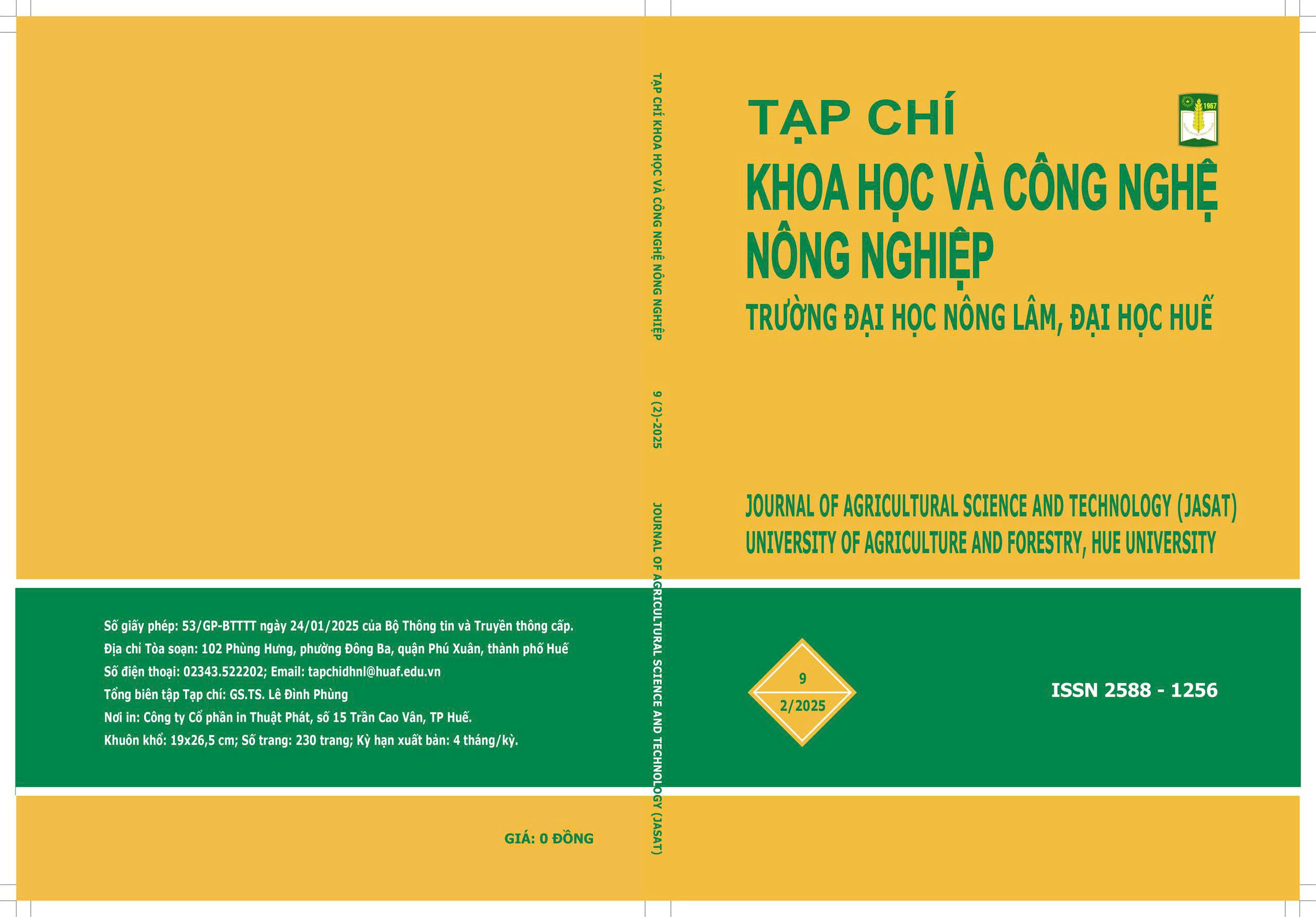##plugins.themes.huaf_theme.article.main##
Tóm tắt
Du lịch cộng đồng không chỉ góp phần vào phát triển bền vững mà còn là một phương thức hiệu quả để thúc đẩy trao quyền cho phụ nữ, đặc biệt ở các vùng nông thôn và ven biển. Nghiên cứu này tập trung phân tích các yếu tố rào cản và thúc đẩy trao quyền cho phụ nữ thông qua du lịch cộng đồng tại vùng đầm phá Tam Giang, thành phố Huế. Phương pháp nghiên cứu kết hợp định tính và định lượng, bao gồm khảo sát hộ gia đình, phỏng vấn sâu và thảo luận nhóm, giúp làm rõ trải nghiệm của phụ nữ cũng như các yếu tố rào cản đến sự tham gia của họ trong du lịch cộng đồng. Kết quả nghiên cứu cho thấy phụ nữ đã đạt được quyền kinh tế thông qua việc cải thiện thu nhập, quyền xã hội thông qua nâng cao vị thế trong gia đình và cộng đồng và quyền tâm lý qua sự tự tin và phát triển năng lực cá nhân. Tuy nhiên, vẫn tồn tại những rào cản về kiến thức chuyên môn, sự hỗ trợ từ gia đình và cơ hội tiếp cận các nguồn lực kinh tế. Do đó, nghiên cứu đề xuất các chính sách và chương trình hỗ trợ nhằm thúc đẩy sự tham gia của phụ nữ trong du lịch cộng đồng, góp phần vào sự phát triển bền vững của địa phương.
##plugins.themes.huaf_theme.article.details##
Tài liệu tham khảo
Hoàng Dũng Hà, Nguyễn Quang Tân, Phan Thị Thu Thảo, Pham Hữu Tỵ, Nguyễn Thị Thúy Hiền và Nguyễn Văn Chung. (2021). Hiện trạng và mô hình phát triển du lịch dựa vào cộng đồng tại Thừa Thiên Huế. Hue University Journal of Science: Agriculture and Rural Development, 130(3A), 53-69.
Trần Hạnh Lợi và Hoàng Thị Liễu. (2023). Yếu tố tác động đến sự tham gia của người dân vào phát triển du lịch cộng đồng ở xã Quảng Lợi. Tạp chí Khoa học Quản lý và Kinh tế, Trường Đại học Kinh Tế, Đại học Huế (27).
Nguyễn Thị Huyền, Phạm Lê Thảo và Trần Minh Hiếu. (2021). Du lịch cộng đồng và khởi nghiệp nữ tại nông thôn Việt Nam. Tạp chí Khoa học Phát triển Nông thôn, 19(3), 44-56.
Trần Thiện Cảm. (2018). Kinh nghiệm và giải pháp phát triển bền vững du lịch cộng đồng cho miền núi Việt Nam. Tạp chí Kinh tế & Quản trị Kinh doanh, (890), 2–6.
Trần Thị Mai và Nguyễn Văn Toàn. (2020). Đào tạo kỹ năng mềm trong phát triển du lịch cộng đồng bền vững. Tạp chí Giáo dục, 5(2), 60–67.
Aghazamani, Y., & Hunt, C. A. (2017). Empowerment in tourism: A review of peer-reviewed literature. Tourism Review International, 21(4), 333–346.
Chen, Z., Li, L., & Li, T. (2017). The organizational evolution, systematic construction, and empowerment of Langde Miao's community tourism. Tourism Management, 58, 276-285.
Cole, S., & Ferguson, L. (2015). Tourism and inequality: Problems and prospects, 224.
De Jong, A., & Figueroa-Domecq, C. (2022). Assessing the UNWTO’s global report on women in tourism: Tourism’s impact on gender equality. In: Handbook of Tourism Impacts (pp. 151-165). Edward Elgar Publishing.
El-Manhaly, S., & Taha, S. (2024). The effect of community-based tourism on woman empowerment: A case study of Nubian women. International Journal of Tourism and Hospitality Studies, 6(2), 87-107.
Friedmann, J. (1992). Empowerment: The politics of alternative development. John Wiley & Sons.
Giampiccoli, A., & Mtapuri, O. (2012). Community-based tourism: An exploration of the concept(s) from a political perspective. Tourism Review International, 16(1), 29-43.
Gutierrez, L., Parsons, R. J., & Cox, E. (1998). Empowerment in social work practice: A sourcebook. Brooks/Cole Publishing Company.
Hanson, S. (2009). Changing places through women’s entrepreneurship. Economic Geography, 85(3), 245-267.
Idris, I., Herdiani, A., & Adi, K. R. (2023). Community-based tourism-based women empowerment: A qualitative approach. International Conference on Social Knowledge Sciences and Education (ICSKSE 2023).
Irawan, N., & Nara, V. (2020). Managing women empowerment through participation in sustainable tourism development in Kampong Phluk, Siem Reap, Cambodia. International Journal of Economics, Business and Accounting Research (IJEBAR), 4(2), 262–268.
Kibanja, G., & Munene, J. (2024). Relationship between participation in implementation, cultural collectivism and psychological empowerment among women in Zanzibar tourism industry. International Journal of Academic Research in Business and Social Sciences, 14(11), 41-51.
Külekçi, E., Sezen, I., & Bulut, Y. (2012). The role of women in rural tourism, the sample of Gaziler Village (Bardiz), Erzurum, Turkey. Journal of Food, Agriculture and Environment, 10(2), 1314-1319.
Mahmud, S., Shah, N. M., & Becker, S. (2012). Measurement of women’s empowerment in rural Bangladesh. World Development, 40(3), 610-619.
McCall, C., & Mearns, K. (2021). Empowering women through community-based tourism in the Western Cape, South Africa. Tourism Review International, 25(2-3), 157-171.
Moswete, N., & Lacey, G. (2015). Women cannot lead: Empowering women through cultural tourism in Botswana. Journal of Sustainable Tourism, 23(4), 600-617.
Pavlović, D., Bjelica, D., Bodroža, D., Jovičić, E., & Pindžo, R. (2023). Women’s economic empowerment through tourism: A case study of selected Western Balkans countries. Journal of Women’s Entrepreneurship and Education, 3-4, 149-175.
Scheyvens, R. (2000). Promoting women's empowerment through involvement in ecotourism: Experiences from the Third World. Journal of Sustainable Tourism, 8(3), 232-249.
Scheyvens, R. (2022). Tourism and poverty. In R. Butler & D. Harrison (Eds.), Tourism and developing countries (pp. 117-130). Routledge.
UN Women. (2018). Women’s participation in community-based tourism in Northern Vietnam. United Nations Entity for Gender Equality and the Empowerment of Women.
Zhou, L., & Liu, K. (2008). Community tourism as practiced in the mountainous Qiang region of Sichuan Province, China: A case study in Zhenghe Village. Journal of Mountain Science, 5, 140-156.


